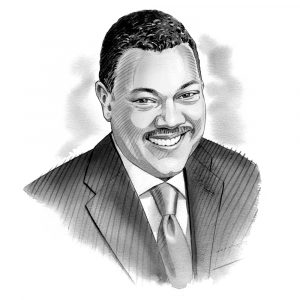Who is an American citizen? That question was apparently settled by the Fourteenth Amendment, which declared birthright citizenship following the Civil War. But as Martha S. Jones, Society of Black Alumni Presidential Professor at Johns Hopkins, wrote in her book Birthright Citizens (Cambridge University Press), African Americans were battling for their rights in the courts long before. During a visit to BC Law, she sat down with Dean Vincent Rougeau, who has long studied the rights and responsibilities of citizenship, to discuss this struggle.

MJ: Before I became a historian, I had a first career as a public interest lawyer, and I spent most of those ten years in local courthouses representing ordinary people in housing, in public benefits, and in family matters. Oftentimes, the court system treated those things as
if they were minor matters. But I knew not only their import to my clients, but also, ultimately, to big constitutional questions.
When I become a historian, that stayed with me, and I began to poke around in courthouse records from the nineteenth century to test, if you will, that hypothesis. So in some ways this is very much a book that is an homage to the people I worked with when I was in practice. At the same time, we have come to exaggerate the insights to be derived from a notorious Supreme Court case, Dred Scott v. Sandford. I believed that there was more to the story of race and citizenship before the Civil War, before Reconstruction, in fact.
VR: Your findings demonstrate that there was a recognition that the law mattered and that it was a bedrock, unifying aspect of what created the idea of being an American. As a settler nation, as a place where people had come together from all over the world for different reasons, the unifying notion of the Constitution, of the rule of law, was incredibly important. It’s significant that it filtered down to people who had been enslaved and were recently emancipated to the degree that they recognized that they needed to engage the government. They needed to get involved in voting. They needed to engage the courts.
Before Reconstruction fell apart, you see extraordinary progress for black people in the United States through being elected to public offices, purchasing land, doing all kinds of things that would have been unthinkable prior to that point.
MJ: The only reason citizenship emerges as a substantive question before the Civil War, beginning in the 1820s and coming forward, is because black Americans raise it. Because by the ’20s, there are important and robust African American communities.
I study Baltimore, but we could look at Philadelphia, we could look at New Orleans, we could look at Charleston, Boston. In all these places, at that time, African Americans are meeting in conventions. They’re publishing newspapers and tracts. It is they who ask the question, “Aren’t we citizens of the United States?” and they begin to read the Constitution, begin to push on legal culture and challenge lawyers and judges and treatise writers.
“The only reason citizenship emerges as a substantive question before the Civil War…is because black Americans raise it. …It is they who ask the question, ‘Aren’t we citizens of the United States?’”
VR: It is fascinating that the notion of citizenship wasn’t really openly discussed in the earliest stages of the republic. Instead, the idea of who would be a citizen was assumed, because these were white male property owners who were having a conversation amongst themselves. Then, of course, there were all of these other people to be considered. Not only do you have slaves and free people of color, you have these immigrants coming in waves. They didn’t necessarily speak the same language. They practiced different religions. How did they fit into the body politic?
As you were speaking, I was thinking about my own family’s history in Louisiana, which also had a very large category of free people of color, some of whom were released out of slavery, some of whom came from other French and Spanish colonies where they had a different status, and so they were importing a status into American territory that didn’t necessarily exist in American law. This was all churning in the nineteenth century as we were moving towards the Civil War.
The fact that people are understanding the law as a vehicle for possibly securing a settled understanding of their existence in this nation is really fascinating. It says how important the rule of law is in the minds of the culture and of the nation.
MJ: Dred Scott left us with the impression that the color line was the line to draw in order to analytically think through the status of free people of color. But it turns out, there was an interest convergence in a local courthouse that meant that all sorts of people on any given day could be interested in making sure that free people of color enjoyed a modicum of rights. They might rethink it in the next year or the next decade, but the folks I write about were exploiting every opening and opportunity that they had.



